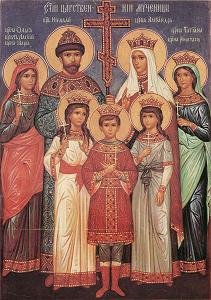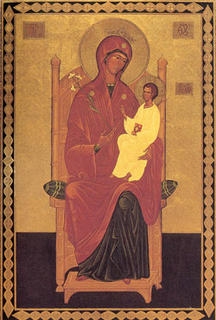
Here follows an article from Orthodox News about the situation with St Seraphim's, reproduced here by kind permission of Fr Andrew Bond.NEXT YEARIn 2006 St Seraphim's will celebrate a Ruby Jubilee, the 40th anniversary of its foundation. In 1996 Deacon Mark Meyrick was ordained to the priesthood in London by Archbishop Nikodem. The newly-ordained Fr Mark settled in Little Walsingham, Norfolk, where he had secured premises to establish an Orthodox presence. The only building available that he could afford to rent was the derelict railway station.
Fr Mark was supported by a group of friends who formed the
Brotherhood of St Seraphim. In the first instance this was not intended to be a monastic community as such, although Fr Mark did subsequently accept the monastic tonsure and thus is better known to most of you as Archimandrite David.
SAINT SERAPHIM'S CHURCHThe former station was rapidly transformed into a church centre. The old ticket office was gutted and transformed into a church. Residential buildings were constructed on the old station platform. The brotherhood established an ikon studio and this provided a substantial part of their income.
St Seraphim's serves pilgrims to Walsingham and, over the years, many people have had their first encounter with the Orthodox Church through visiting St Seraphim's, including me.
SHOCK NEWSMany of you may not realise that Norfolk County Council still owns the property. They had taken it over after the railway line was closed by Dr Beeching. The current lease expired on 1 September this year. The rent had been £2100 per annum but the council is asking £9000 per annum for the new lease - a staggering increase. In the past the council always refused to sell the former station property on the basis of their proposal to use the line of the old railway track as a new Falkenham to Wells road. In forty years this plan has failed to materialise and, most likely, never will. Indeed now, for the first time, the council has agreed that the sale of the property is an option. And the price? Well, they have not given us an exact price but a recent letter from the county council says a figure "substantially in excess of £120 000".
SO WHAT HAPPENS NEXT?It might sound a bit flippant to say
whatever God wills, but, whatever it is, we have got to do it. Who are
we? Clearly, all who owe a debt to Fr David, all who love St Seraphim of Sarov, indeed, all who value the witness of St Seraphim's church.
St George Orthodox Information Service and St Seraphim's Brotherhood share the same founder. We, SGOIS, therefore, feel it is incumbent upon us to do everything in our power to secure the future of St Seraphim's as Fr David's memorial.
St Seraphim's is a pilgrim's church. It was never intended to be a parish. When a congregation began to assemble in Walsingham, Fr David encouraged the establishment of a parish as a separate entity. This is why the Transfiguration parish in Great Walsingham came into being. But it does mean that St Seraphim's doesn't have parishioners. All of us, who love and support St Seraphim's, have other parish allegiances and this can look like the problem of divided loyalties, but it should not. Caring for St Seraphim's is complimentary to all our other responsibilities.
DECISION TIMEWalsingham is a world famous place of pilgrimage. In May, the Eastern Daily Press reported that the Roman Catholic Church is building a new church (Annunciation) in Friday Market Place, Little Walsingham, at a cost of £1.2million. In August the EDP reported on a plan by the Anglican shrine to develop their facilities for visitors at a cost of £2million.
In comparison, our financial needs look trivial, but only in comparison! However, we must not underestimate the importance of St Seraphim's for the witness of Orthodoxy as a whole. Dare we allow St Seraphim's to close? It is one of the few Orthodox churches in this country to be open for visitors every day. Also, Walsingham attracts thousands of pilgrims, many of whom visit St Seraphim's to pray. For many, this is their first ever visit to an Orthodox church. We cannot afford to lose it.
WHAT CAN WE DO?Clearly we will keep everyone informed of all developments through
Orthodox News. Buying the property is the only viable option.
A category has been added to out order form to enable you, of your kindness, to add an extra bit which we will pass on to St Seraphim's for the fund. Over the past year or so, we have been collecting books for a secondhand booklist. The first edition of this list is now ready and is available on request. All the proceeds will go to St Seraphim's. There are still a few of the St Seraphim's mugs (commemorating the centenary of his glorification) available (22 to be precise) and we will sell these at £5 each for the fund.
A new series of postcards of St Seraphim's is being planned. These will be views of the interior and exterior of the church, and possibly the large ikon cross which is made of slate. Fr David's
All Saints ikon is another card we plan to publish after Christmas.
Many of us might wish to contribute more than we can personally afford So, how can this be done? Well, you might sell your unwanted items in a boot sale, organise a fund-raising dinner, organise a raffle, or persuade your parish priest to take up a retiring collection. If you have items you no longer want, antiques, a picture, furniture or whatever, send it to your local auction rooms and send us the proceeds. Some smaller items, books, jewellery, etc. could be sent to us and we will sell them for the best price we can get. Then there is that hackneyed old favourite - sponsorship. I would be prepared to set the ball rolling. Those of you who know me will understand the significance of this suggestion. For sufficient sponsorship, I would be prepared to have a haircut, the firt in more than ten years. Any offers?
SGOIS will do everything possible to secure the future of St Seraphim's. If the plan fails, the property could be sold to a developer. The bulldozers would then move in very quickly. Can we allow this to happen? The honour of the Orthodox Church is at stake here because the church will not be destroyed by an enemy from outside, but by our own lack of care.
One last thing; we can call on St Seraphim for help. SGOIS is preparing to print the text of the Akathist hymn to St Seraphim. This will be available from us and from St Seraphim's at a modest cost. Please use it regularly.










